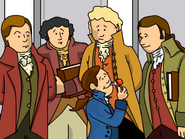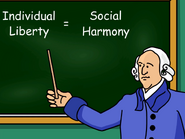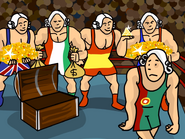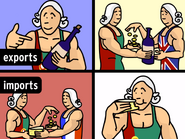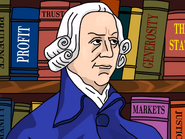| Adam Smith | |||
|---|---|---|---|
 | |||
| Airdate | December 2002 | ||
| Curriculum | Math Social Studies | ||
Adam Smith is a BrainPOP Math video that aired on December 2002.
Summary[]
At the intro of the plot, Tim and Moby are at a port in Oakland, California. A seagull bumps into a crate box, causing it to knock Moby's head off.
At the end of the video, Moby often wears a glasses that disguises as a year and Tim says, "Yeah, you'll make a killing on those."
Appearances[]
Trivia[]
- According to Tim (in spite of the fact that he was cut off), gantry cranes inspired the AT-AT walkers in Star Wars.
- Moby's glasses read "2008".
Quotes[]
- Tim: Whoops, better keep your eyes peeled.
- [last lines, Moby comes out and wears 2008 glasses and holds a box]
Transcript[]
Quiz[]
FYI Comics[]
Way Back When[]

Adam Smith invented economics as we know it today, but that doesn’t mean there wasn’t any scholarship on the subject before him. Here are some of the highlights of pre-Smith economic thought.
The Ancient Sumerians developed the earliest known market economy. For money, they used grain: A certain weight of grain equaled one unit of money, called a shekel.
In works like the Oeconomicus, Greek historian Xenophon (c. 430–354 B.C.E.) explores a number of economic issues, including: the importance of foreign trade; division of labor; and how to value different goods.
In the Arthashastra (“The Science of Material Gain”), Indian politician and philosopher Chānakya (c. 350–283 B.C.E.) discusses economic policy, economic ethics, and the concept of welfare.
In his History of the World,Tunisian economist Ibn Khaldun (1332–1406 C.E.) links economic growth to division of labor, and accurately notes that supply and demand determine the prices of goods.
Just before Adam Smith’s time, the Physiocrats, a school of economic thought, proposed that labor and land were the sources of a nation’s wealth. For some reason, however, the Physiocrats were convinced that only agricultural labor created wealth.
From this small sampling of economic thought before The Wealth of Nations, it’s clear that Adam Smith didn’t so much invent the field of economics as tie together many different rules of thumb and theories into one cohesive philosophy.
Myths[]

In the United States, libertarians—people who believe that government activity should be kept to a bare minimum—say that the government is too deeply involved in private business, and that the economy would flourish if Washington would just get out of the way. They often point to Adam Smith as an intellectual forefather, claiming that he argued for a completely free market, with no government intervention whatsoever. But is this true?
In most historians’ opinions, hardly. It is true that one of Smith’s goals in writing The Wealth of Nations was to reduce government meddling in private business. However, it’s important to remember that he was talking about mercantilist governments, which were far more controlling than the U.S. government is today.
Unlike the most extreme free marketers today, for example, Smith wholeheartedly believed that citizens have a responsibility to pay taxes to their government. He supported the idea that governments should provide public services, such as road-building and education, both of which require taxpayer funding.
Even as an advocate of free trade, Smith believed that tariffs — taxes on imports — were sometimes necessary. In addition, he felt that governments should support new industries for the benefit of the wider economy.
In short, Smith was a pragmatist, more interested in defining an economic system that worked in practice than clinging to a theoretical view of the world.
Above all else, Adam Smith wanted to foster an economy that resulted in equality for all citizens. So while he supported a system where people pursue their own selfish interests, he only did so as far as it benefitted society as a whole.
Quirky Stuff[]

There aren’t many details available about Adam Smith’s private life, mainly because he ordered his personal papers to be burned after his death. However, here are some choice tidbits taken from the reports of his contemporaries!
When Adam Smith was about three or four years old, he was kidnapped by a band of gypsies! He was rescued shortly thereafter.
Smith was in the habit of talking to himself. Alexander Carlyle, a friend of Adam Smith’s, describes him this way: “In company he stood apart from the others, moving his lips and talking to himself, and smiling, always smiling.”
Smith was known to be a hypochondriac, someone who suffers from imaginary illnesses.
There are only a few portraits and other likenesses of Adam Smith, and all of them were drawn from memory. Smith never sat for a portrait, possibly out of self-consciousness about his looks. He was said to have a big nose, bulging eyes, a lower lip that stuck out, and a twitch.
There are a number of funny stories about Smith’s absentmindedness. In one, he is said to have been so caught up in his thoughts that walked out of his house in his nightgown. By the time he “came to,” he was miles from home!
For all his accomplishments, Adam Smith expressed regret on his deathbed for not having achieved more in life.
Theory[]
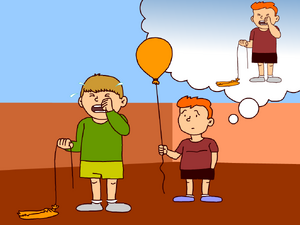
The Wealth of Nations is generally considered Adam Smith’s masterpiece, but Smith himself favored his first book,The Theory of Moral Sentiments. In it, he set out to explore human morality: how we tell right from wrong, why we care, and what it means for society.
Smith was convinced that human ethics, our ability to judge right from wrong, must have a rational cause. This was in contrast to many philosophers of his day, who attributed our morals to everything from a special sixth sense to a spark from God.
In The Theory of Moral Sentiments, Smith argues that ethical judgment starts with our sense of sympathy for other people. By “sympathy,” Smith did not mean pity. Instead, he meant an act of imagination, in which we put ourselves in another person’s situation and imagine how we might feel if we were in his shoes.
If we sense that he is acting as we would, we feel a connection to him; if he’s acting in a way we can’t understand, however, we feel dislike. The ability to imagine how others feel pushes us to help them when they’re in need. It also prompts us to behave ourselves, since we understand that others are watching us, imagining themselves in our shoes.
This view of people constantly imagining what others think may sound like it contradicts The Wealth of Nations, with its focus on selfishness. However, Smith felt that morality was something that varies by situation: In business transactions, we’re more concerned with ourselves; in social relationships, we focus more on others’ needs.
FYI Comic[]

At baseball




